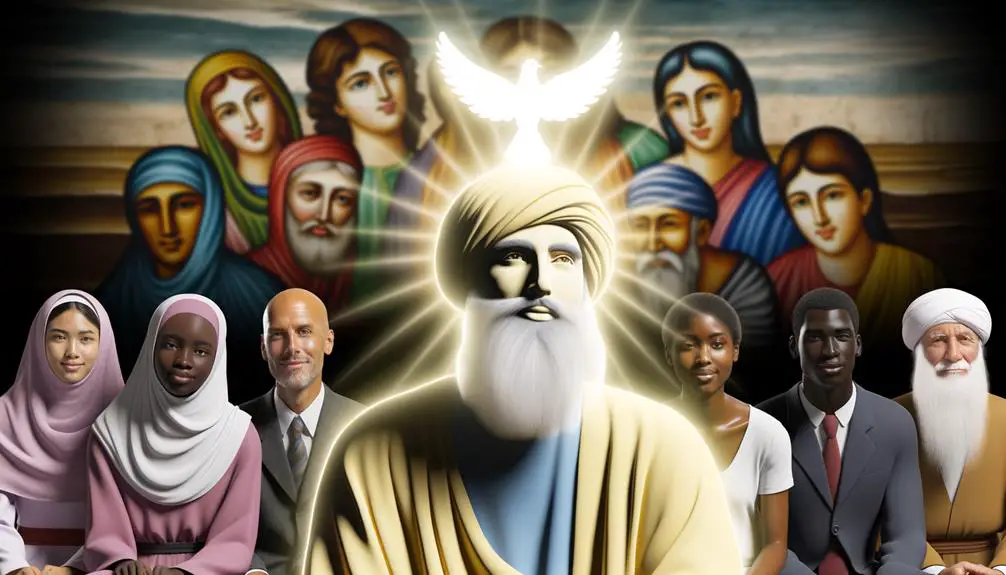An exploration into how power and authority weave through biblical narratives, revealing timeless insights on leadership and morality.

Power and Authority in the Bible
Navigating through the Bible's landscape, you'll find that power and authority aren't merely threads in the fabric of its narrative; they are the warp and weft that hold it together. As you explore, you'll uncover how divine authority defines the boundaries of right and wrong, how leaders shape their legacies through their exercise or abuse of power, and how prophets wield their influence.
At the heart of it all stands Jesus, embodying authority in a form that challenges both the heavens and the earth. But to grasp the full measure of this dynamic, you must venture further into the nuances of parables, confrontations, and the delicate balance between submission and sovereignty.
What lessons might these ancient texts hold for our modern understanding of leadership and moral authority?
Key Takeaways
- Divine authority in the Bible dictates moral law and guides human destiny through a structured celestial hierarchy.
- Biblical leadership and governance embody ethical responsibility, emphasizing courage, humility, and servant leadership.
- Jesus represents the ultimate authority, demonstrating divinity through teachings and miracles that challenge traditional power dynamics.
- Parables and acts of defiance against oppressive rulers highlight the importance of ethical leadership and accountability under divine judgment.
Divine Authority Defined

Divine authority, a cornerstone concept in biblical theology, refers to God's absolute right and power to govern the universe, dictate moral law, and guide human destiny. This authority isn't merely a theoretical construct; it's realized through divine governance, a system that permeates every layer of existence, from the grand celestial hierarchy down to the intricate details of individual lives.
You'll find that the concept of divine governance is deeply embedded in biblical narratives, presenting a God who's actively involved in the world's affairs. This involvement isn't random or whimsical; it's structured through a celestial hierarchy that defines roles and responsibilities among spiritual beings. Angels, for instance, serve as messengers and agents of God's will, executing divine mandates and providing a glimpse into the complexities of divine administration.
This celestial hierarchy also points to a well-ordered universe under God's control, contradicting any notion of chaos or randomness. It's a testament to a God who's not only the creator but the sustainer and ruler of all that exists. Through this governance, God exercises moral authority, setting the standards of right and wrong that guide human conduct.
Understanding divine authority, therefore, requires you to grapple with these themes of divine governance and celestial hierarchy. It's a recognition of God's unrivaled position of power and the structured manner in which this power is exercised. This foundational concept challenges you to see beyond the physical realm, acknowledging a divine order that governs the cosmos and shapes human destiny.
Leaders and Their Legacies

Throughout history, leaders within the biblical narrative have left indelible marks on their communities and the broader course of religious history, shaping not only the immediate world around them but also setting precedents for governance and moral authority. These figures, through their distinct leadership styles, have navigated the complex terrain of ethical governance, providing a blueprint for moral leadership that resonates through the ages.
Analyzing their legacies, you can discern a pattern in how these leaders' approaches to power and authority continue to influence contemporary perspectives on leadership and governance. Their stories offer a rich tapestry of lessons on the exercise of authority, the responsibilities of leadership, and the ethical dilemmas that often accompany power.
Consider the following key aspects that underscore the emotional and moral gravity of their legacies:
- The Courage to Lead: Their stories are testament to the courage required to lead with conviction, often in the face of overwhelming opposition or adversity.
- The Wisdom to Govern Ethically: They provide enduring examples of ethical governance, navigating complex moral landscapes to make decisions that prioritize the welfare of the community.
- The Legacy of Moral Authority: Their lives leave a legacy of moral authority, serving as beacons that guide current and future leaders in the exercise of power with integrity and compassion.
Prophets as Power Brokers

Building on the exploration of leadership legacies, it's crucial to examine how prophets in the biblical narrative wielded their influence as pivotal power brokers. These individuals, often seen as miracle workers, navigated a complex landscape of ethical dilemmas and societal expectations. They didn't just predict the future; they actively shaped it by challenging kings, enacting divine justice, and leading social reforms.
Prophets like Elijah and Isaiah stood at the intersection of divine will and human affairs, leveraging their unique positions to guide, correct, and sometimes confront the powers of their time. Their roles were not just spiritual but deeply political, as they mediated between God and the people, often swaying the course of history through their words and actions.
Prophet |
Role |
Impact |
|---|---|---|
Elijah |
Miracle Worker |
Challenged royal authority and brought divine intervention |
Isaiah |
Ethical Guide |
Advocated for justice, warning against societal complacency |
Jeremiah |
Social Reformer |
Called for repentance, highlighting the consequences of moral decay |
These prophets exemplified how spiritual authority could translate into tangible power, influencing kings and shaping the moral fabric of society. They remind you that true power often comes from an unwavering commitment to ethical principles and the courage to speak truth to authority. In their stories, you find a rich tapestry of challenges, victories, and lessons on the nature of power and responsibility throughout the biblical narrative.
Jesus: Authority Incarnate

As you explore the concept of Jesus as Authority Incarnate, you'll notice his unique position in biblical narratives through his miraculous healings, command over nature, and unparalleled teaching authority.
These aspects not only distinguish him from prophets who preceded but also underscore the profound embodiment of divine power and wisdom he represents.
This exploration offers a deeper understanding of how authority is manifested and recognized in biblical contexts.
Jesus' Miraculous Healings
Jesus' miraculous healings serve as a profound demonstration of his unparalleled authority and divine power, embodying his role as the incarnate Word. Through his healing ministry, Jesus not only restored physical health but also offered spiritual renewal and deeper faith. These acts of faith healing underscore the interconnectedness of body, spirit, and divine intervention.
- Compassion: Jesus' healings emanated from deep compassion, touching the hearts of sufferers and onlookers alike.
- Faith: The healings often required a leap of faith from those seeking healing, illustrating a dynamic relationship between human belief and divine action.
- Transformation: Beyond physical healing, these miracles transformed lives, instilling hope and faith in communities, and challenging societal norms around illness and purity.
Analyzing Jesus' miraculous healings reveals the multifaceted nature of his authority, blending compassion with power, and inviting followers into a transformative experience of faith.
Commanding Nature's Forces
In several instances, the Bible showcases how, with divine authority, Jesus commanded nature's forces, illustrating his sovereignty over the created world. Unlike the Old Testament event of the ocean parting, which demonstrated God's intervention through Moses, Jesus's acts directly calmed the forces of nature. His command over the weather, particularly when calming a storm on the Sea of Galilee, underscores a direct, authoritative control over the elements.
This act, devoid of any intermediary, highlights Jesus's unique position as authority incarnate. Analyzing these narratives, it's evident that Jesus's ability to command nature serves as a testament to his divinity and ultimate authority. The calming of the weather, especially, stands as a symbolic gesture of peace and reassurance to his followers, transcending mere physical control to embody spiritual sovereignty.
Teaching With Authority
Throughout his ministry, Jesus taught with an unparalleled authority, distinguishing his teachings from those of contemporary religious leaders and directly exemplifying his divinity. His approach altered classroom dynamics and challenged cultural interpretations, demonstrating a revolutionary way of understanding and living out spiritual truths.
Consider these impacts:
- Classroom Dynamics: Jesus' method of teaching wasn't just about imparting knowledge but about transforming hearts. His authority brought a sense of immediacy and intimacy to his lessons, breaking down barriers between teacher and student.
- Cultural Interpretations: By addressing and often contradicting the prevailing interpretations of the Law, Jesus invited his listeners to see beyond the literal to the spiritual, urging a deeper, more personal engagement with Scripture.
- Emotional Resonance: His words stirred emotions, from awe to offense, leaving no one indifferent. This emotional engagement was crucial for driving home his message of love and redemption.
Parables of Power

The Bible's parables often encapsulate profound truths about power and authority, inviting readers to delve into deeper layers of meaning and implication. These narratives don't just tell stories; they unfold complex ideas about symbolic governance and metaphorical dominion. Through allegory and metaphor, the parables dissect the nuances of leadership, stewardship, and moral authority, challenging you to reflect on the nature of true power.
Take, for instance, the parable of the talents. At its surface, it's a story about responsibility and the use of gifts. However, a closer look reveals it as a discourse on accountability and the consequences of mismanagement or inaction in positions of trust. Here, you're nudged to consider not just the stewardship of resources, but also the broader implications of leadership and the exercise of authority.
Similarly, the parable of the good shepherd illustrates the concept of protective leadership and the lengths to which legitimate authority will go to safeguard those under its care. It contrasts sharply with images of tyranny or neglect, underscoring the responsibility that comes with power. You're led to appreciate the weight of moral and ethical considerations that should guide those in positions of influence.
These parables, and others like them, serve as timeless reminders of the complexities surrounding power and authority. They caution against the misuse of power while highlighting the virtues of wise and compassionate governance. Through their symbolic narratives, you're encouraged to ponder the essence of just leadership and the profound impact it can have on society.
Challenges to Earthly Rulers

In examining the Bible, you'll find that challenges to earthly rulers often come in two forms: resistance by biblical figures and divine judgment on kings. These elements highlight the complex relationship between divine authority and human governance.
They prompt you to consider how legitimacy and moral responsibility were negotiated in biblical narratives.
Biblical Figures' Resistance
Challenging earthly rulers, numerous biblical figures demonstrated profound courage and faith in their defiance against oppressive regimes. This resistance, embodied through acts like Moses' defiance against Pharaoh and Apostolic disobedience to Roman authorities, underscores a pivotal theme of divine authority superseding human power.
Here's how these acts of resistance resonate deeply:
- Moses' stand against Pharaoh wasn't just a quest for freedom; it was a testament to unwavering faith in divine justice over human tyranny.
- Apostolic disobedience showcased a profound commitment to a higher moral law, often at great personal risk.
- These acts of defiance stirred communities to evaluate the legitimacy of their leaders, sparking movements towards justice and moral governance.
In essence, these biblical narratives offer a lens through which to examine the complex interplay between divine command and earthly authority.
Divine Judgment on Kings
Throughout biblical history, divine judgment on kings serves as a critical examination of how divine authority contests and often overrules earthly power. This divine retribution manifests as a consequence of royal misconduct, underscoring the supremacy of divine law over human rulership.
King |
Outcome of Divine Judgment |
|---|---|
Saul |
Kingdom torn away |
David |
Personal and familial strife |
Solomon |
Kingdom divided |
Ahab |
Downfall and death |
Nebuchadnezzar |
Madness and displacement |
These examples highlight the biblical narrative's consistent theme: when kings deviate from divine mandates, the repercussions are severe. It's a sobering reminder that earthly rulers are ultimately accountable to a higher authority, emphasizing the transient nature of human power in the face of divine will.
Submission and Sovereignty

The biblical narrative intricately weaves the themes of submission and sovereignty, requiring readers to discern the complex relationship between human autonomy and divine authority. Within this dynamic, two concepts emerge as pivotal: rebel ethics and servant leadership. Rebel ethics in the biblical context challenge unjust human authority, advocating for a higher moral standard aligned with divine principles. Servant leadership, exemplified by Jesus Christ, underscores the power in humility and the strength in serving others, offering a profound commentary on the nature of true authority.
Understanding the balance between submission to God's sovereignty and the ethical imperative to resist unjust authority involves grappling with several key emotions:
- Awe at the unfathomable depth of God's sovereignty, which encompasses creation, providence, and redemption.
- Humility, realizing our limited understanding and power in the face of divine omnipotence.
- Courage to live out rebel ethics and servant leadership despite the challenges and opposition that may arise.
These emotions aren't just byproducts but essential components of a faith journey that navigates the intricate dance between submission and sovereignty. They remind us that our ultimate allegiance is to a higher authority, one that calls us to both humble submission and courageous action in the face of earthly powers that contradict divine will. This dual call demands discernment, wisdom, and a heart attuned to the whispers of the Spirit, guiding us through the complex terrain of living faithfully within God's sovereign domain.
Frequently Asked Questions
How Do Modern Interpretations of Biblical Authority Differ From Traditional Views, Particularly in Contemporary Religious Movements?
Modern interpretations differ significantly from traditional views, especially in contemporary religious movements. You'll notice that digital hermeneutics and enhanced scriptural literacy allow for a broader, more inclusive understanding of texts.
This shift has led to diverse interpretations that challenge conventional beliefs. As you delve deeper, you'll see how these movements leverage technology and education to reinterpret authority, moving beyond traditional confines and inviting a more personalized engagement with sacred texts.
In What Ways Have Feminist Theologians Re-Examined the Concepts of Power and Authority in the Bible, Challenging Traditional Patriarchal Perspectives?
You've seen feminist theologians delve deep, challenging traditional views by spotlighting Eve's Agency and amplifying Sarah's Voice.
They argue these figures aren't mere followers but pivotal characters with influence and autonomy. This approach shakes the foundations of long-held patriarchal interpretations, suggesting a more inclusive reading of biblical narratives.
How Does the Concept of Power and Authority in the Bible Intersect With Issues of Social Justice and Liberation Theology?
You're exploring how social justice and liberation theology intertwine with divine justice, delving into how scripture's power dynamics support or challenge liberation praxis.
This analysis isn't just about religious doctrines; it's a critical examination of how these spiritual concepts advocate for or against the oppressed, guiding actions towards equitable solutions.
Your inquiry sheds light on the broader implications of biblical interpretations, urging a reevaluation of traditional views to align with contemporary social justice movements.
Can the Exercise of Power and Authority in the Bible Be Reconciled With Modern Democratic Ideals and Human Rights Principles?
You're exploring whether traditional exercises of power and authority can align with today's democratic compatibility and human rights principles. It's a complex journey, considering authority evolution over centuries. Analyzing this, you'll delve into whether foundational beliefs adapt to modern democratic ideals.
It's not just about historical context; it's about understanding the dynamic nature of authority and its potential to evolve in harmony with contemporary expectations of equality and justice.
How Have Non-Western Cultures and Religions Integrated or Contrasted the Biblical Notions of Power and Authority With Their Own Spiritual Traditions and Texts?
You're embarking on a journey to explore how non-Western cultures engage with their own spiritual texts, contrasting or integrating biblical notions of power and authority.
This exploration delves into cultural syncretism, where traditions blend, and traditional resilience, showcasing how ancient beliefs hold steadfast or adapt.
Analyzing these dynamics offers a scholarly, contextual view, revealing the complex interplay between global religious philosophies and the enduring impact of cultural and spiritual traditions.
Conclusion
In analyzing the biblical narrative, it's evident that divine authority shapes the trajectory of its stories and teachings. Remarkably, over 90 references to 'authority' highlight its significance throughout the scriptures, underscoring a complex interplay between divine mandate and human agency.
This intricate balance between submission to divine will and the exercise of earthly power invites a deeper reflection on sovereignty and leadership within a biblical context. Ultimately, the biblical discourse on power and authority serves as a profound commentary on the human condition and divine intention.



Sign up